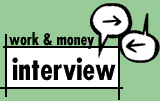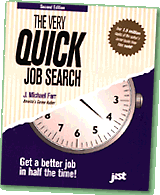
J. Michael Farr
interviewed by Randy Williams on August 12, 1996


J. Michael Farr is the author of more than 20 career guides, including the recently published second edition of "The Very Quick Job Search: Get A Better Job in Half the Time". His books have sold nearly two million copies, and Mr. Farr has come to be recognized as one of the leading authorities of the self-directed job search movement.
Tripod: I've really enjoyed digging my way through "The Very Quick Job Search," but I wondered why you chose that title for a 500-page book.
Mike Farr: (Laughs) The searching goes quickly, not the reading. No, the honest answer is that this project grew out of a 32-page booklet called "The Quick Job Search" that I developed as a resource for career trainers and instructors. The thing is, that booklet didn't necessarily give people enough information to train themselves to be effective job applicants. I figure the more good information people arm themselves with, the faster their search is likely to go.
Tripod: And there is actually a shorter job search guide sort of built in...
MF: That's true. I set the book up so that, if you are in a really big hurry to rush right out and find that job, you can get by with reading just the first seven chapters. Those chapters cover the topics that I think are most important to getting a good job in less time, and you can easily read them in a few hours. The rest of the book expands on those ideas, giving more information for people who still have questions. The job market is getting more tricky and more diverse, so I've put in a whole lot of specific details in those later chapters.
Tripod: So what are the main things you think job-seekers should know about this tricky job market?
MF: Well, first off, I should emphasize the fact that traditional job search methods -- things like reading the help wanted section, filling out applications in personnel offices, blindly sending out resumes, going to the local employment office, signing up with a private employment agency, or applying for civil service jobs -- rarely have much success. This is more true in the era of government cutbacks and corporate downsizing than ever before. Those kinds of techniques encourage you to be passive in your job search, and that's wrong! The worst mistake people can possibly make is being passive in their job search. With very few exceptions, nobody can afford to expect a good job to come looking for them. There may be certain people who get sought out -- top executives or people with highly specialized skills -- but most of us don't fall into those categories. Competition is tough out there, so you need to know how to market yourself effectively, better than the next person.
MF: No, not at all. I actually spend some time in the book on ways to make better use of those methods. But the fact remains that only about 15 percent of all jobs are legitimately advertised in newspapers. A lot of the want ads you see are actually placed by private employment agencies who charge a sign-up fee. Job-seekers often end up being referred to openings that earn a lot less than the ones advertised in the paper -- and the advertised jobs may or may not even exist. And only 1 in 20 people who use private employment agencies get a job that way. Other traditional methods can be pretty discouraging, too -- response rate for unsolicited resumes hovers around 2 or 3 percent. The odds are against finding an easy shortcut.
Tripod: What about electronic resume posting?
MF: Again, this encourages people to be very passive in their job search. There's also something a little silly about thinking that you can just post a document online with your computer and wait for somebody to e-mail you with an offer for your dream job. Truth of the matter is that most of those resumes are scanned electronically for very specific skills or keywords -- many of them looking for years of experience in high-tech fields -- and the response rate is usually even lower than with traditional resumes. Rather than waiting for the job to come to you, you need to figure out how to dig up the best "hidden" jobs and be very aggressive about going after them. Employers respond to that kind of initiative. As I've said for years, the best applicant doesn't typically get the job; the best job seeker does.
MF: Learn a few simple concepts. Résumés don't get jobs, interviews do. You should begin to think of an interview as any face-to-face contact with a person who hires or supervises people with your skills -- even if there is no job opening now. Set about figuring out how to come into face-to-face contact with these people. The two best ways to do that are by using warm and cold contacts. Warm contacts are people you know -- friends, relatives, former employers, teachers -- and people those people know. Anyone can do a little networking, even if they don't have a long list of business contacts. Most people are surprised how many people they know who work in jobs that use their own skills. Even if you only knew one good prospect -- say your Uncle Albert -- if that person can provide two more names, you're on your way. If each one of those two people has two names, and each of those people has two -- you could have 1,024 people in your network after only the tenth level of contact. And it may not take much effort -- some polite conversation and a request to let you know if they hear anything. Cold contacts are harder, but they do work. These are cold calls made by using the yellow pages and the telephone, trying to find the hidden jobs that match your skills.
Tripod: Where are these "hidden jobs" you keep mentioning?
MF: Most of them are in small to medium-sized businesses. In fact, almost 70 percent of all non-government workers are now employed by small companies. This is where the real growth, both in terms of market share and number of jobs, comes from these days -- companies with 20 or fewer employees. The thing is, advertising for a job opening in the newspaper of through other conventional means can totally disrupt business for these small companies -- they may not have the manpower to handle all the phone calls and so on. But they do have job openings -- people leave all the time and the jobs may go unfilled for a while. The advantage of cold contacts is that you can call around and introduce yourself, and make yourself known to these companies even before job openings occur. That way they're already thinking of you. Warm contacts work well here, too -- the person doing the hiring may be able to learn more about you from a referral by a friend or colleague than would be possible in a long search process. (Laughs) Sometimes it really is who you know.
Tripod: Don't you run the risk that these businesses will look at cold calls as kind of a nuisance?
MF: There will be some of that -- you just have to learn to be polite and to know when to retreat a bit. Don't hint around for a job right away -- say something like, "I'm looking for a position as whatever and I thought you might be willing to see me and give me a few ideas." Be careful to write out and practice a phone script that is friendly and intelligent-sounding. Also, you never know when you'll run into somebody who might be a good contact, so I recommend that people print up what I call JIST Cards. These are little 3-by-5 cards with your name, contact information, position desired, and skills. JIST Cards get around the limitations of resumes, cover letters, and business cards. A business card has too little information, and a resume or cover letter is too formal to carry around with you. I've been recommending JIST Cards since the '70s, and you'd be amazed how well they work. (Laughs) They're actually kind of cool because people don't know what the hell to do with them -- people have a system for cards and resumes, but not for these 3-by-5 cards. That actually sort of forces them to pay attention.
MF: Job seekers get themselves in trouble a lot by misunderstanding what kinds of things can be included in skills. Skills don't necessarily have to be something you do -- something specific like knowing a programming language or how to use a machine; they can be a part of your personality -- things like the ability to learn quickly, to work well with others, to be self-motivated, to be able to communicate ideas well. There are really three kind of skills. Adaptive skills are things like personality traits, self-management abilities, punctuality, honesty, and enthusiasm. These are the skills which employers look for the most. Second, transferable skills are general skills that can be used on a variety of jobs -- writing clearly, good language skills, ability to prioritize and organize tasks -- which are also very important. Lastly, job-related skills are specific to different careers. these are the ones most people think of when they say that they don't have any skills -- but the truth is that most employers realize that people who have good adaptive and transferable skills can usually pick up a lot of job-related skills pretty quickly.
Tripod: But typical job listings are full of qualifications that the applicant is supposed to have...
MF: You'd be amazed how many jobs are filled on the basis of the applicant's appearance and perceived dependability. By appearance, I mean not only dress and grooming, but also body language and verbal skills -- from the ability to handle "small talk" to fielding tough interview questions. Credentials are often less important than these things. Good communication, expressing your skills and ideas well, is the most important part of the interview process. Most people who are fired lacked the ability to adapt and get along rather than the ability to do the job itself. Understanding that -- and understanding employer expectations in an interview -- can get you the job over those with better credentials.
Tripod: That would seem to be especially good advice for young people or those seeking a job for the first time.
MF: Exactly. Recent graduates often don't have a wealth of practical work experience to fill up a resume with. Or a woman may put herself down by saying, "I've just been a housewife." Truth is, getting through college or managing a household both involve a lot of skill and talent. These kinds of job seekers may not have an intricate network of business connections or a lot of important sounding titles to their names, but if they can express their ideas and talents in a fresh and unique way, they may actually have an advantage over someone with more experience.
